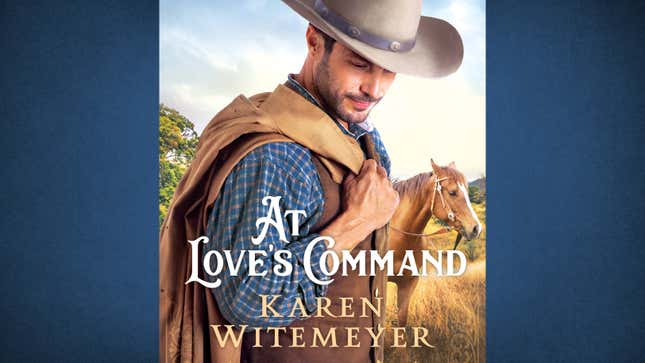The RWA Rescinds Award For Novel That Treats Wounded Knee Massacre as a Backdrop for White Redemption
In Karen Witemeyer's Christian romance, At Love's Command, the massacre is just backstory for a white man's redemption
Latest
Image: Bethany House Publishers
Approximately a year and a half since a highly public existential crisis over institutional racism, and almost exactly six years since the controversial nomination of a romance novel with a Nazi “hero” for a RITA award, Romance Writers of America is once again caught up in controversy. This time, the organization handed one of its annual awards—now named after Black co-founder Vivian Stephens—to a Christian romance about a white Army officer who participated in the Wounded Knee massacre, then rescinded it after an outcry. The kicker: It’s published by the exact same imprint that published the Nazi romance.
At Love’s Command by Karen Witemeyer is published by Bethany House, a longtime powerhouse of Christian fiction. Witemeyer is a popular Christian fiction author who specializes in Western-set historical romances with an explicitly evangelical bent, and her book won the category of Romance with Religious or Spiritual Elements, which essentially always means Christian. At Love’s Command features a woman doctor and the leader of a mercenary company who “defend the innocent and obtain justice for the oppressed,” according to the book description. Why? Well: The book opens with Captain Matthew Hanger of the 7th Calvary participating in the massacre of roughly 300 Lakota at Wounded Knee, one of the most infamous atrocities in America’s long history of atrocities against Native peoples. But the massacre is simply a pretext for his journey of redemption through marriage.
The novel’s prologue is written from Hanger’s perspective and portrays the U.S. Army as essentially forced into the confrontation with the Lakota who unwisely and violently refuse to cooperate with “a simple weapon confiscation. An escort to the reservation.” “These new Ghost Dancing rituals have the men on edge,” Hanger notes at one point; at another, the book describes to a “medicine man’s” dancing as “Taunting. Inciting,” portraying the largely unarmed Lakota as the aggressors. At another point, the book suggests that Hanger and his fellow Calvary soldiers don’t want any part of “cutting down women and children”—which simply does not square with the brutal reality of the so-called “Indian Wars”—but then when women begin taking up guns in response to the Army opening fire, we get this: “If a woman took up arms and stood beside her man in a fight, she opened herself up to the consequences. But a man of honor protected the weaker sex to the best of his ability in all circumstances. Even in war. Especially in war.” Hanger also shoots a child but Witemeyer is quick to note that the child is armed and thus, like the Lakota women, a combatant.
-

-

-

-

-

-

-

-

-

-

-

-

-

-

-

-

-

-

-

-

-

-

-

-

-

-

-

-

-

-

-

-

-

-

-

-

-

-

-

-








































